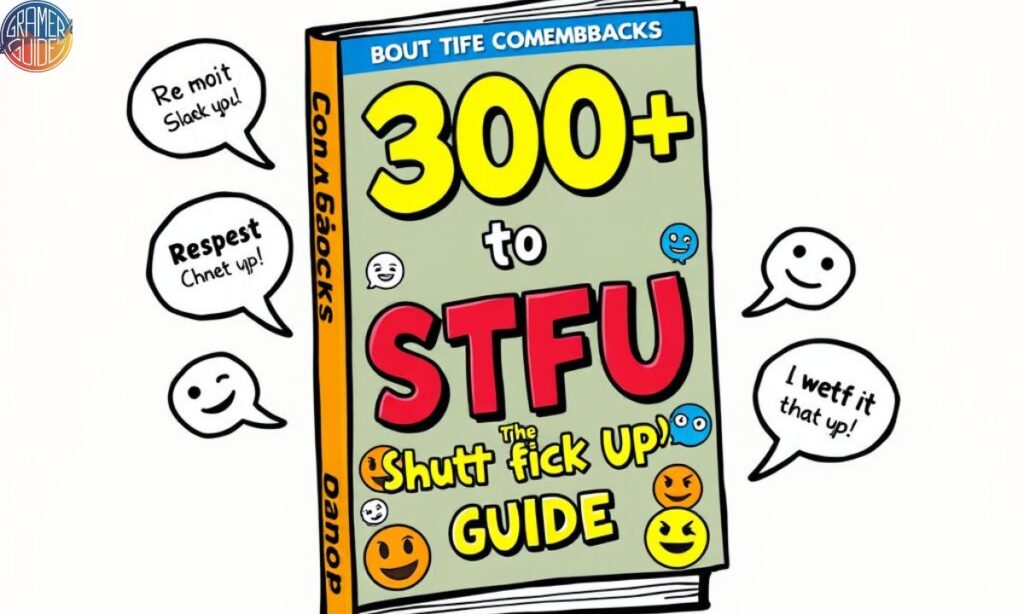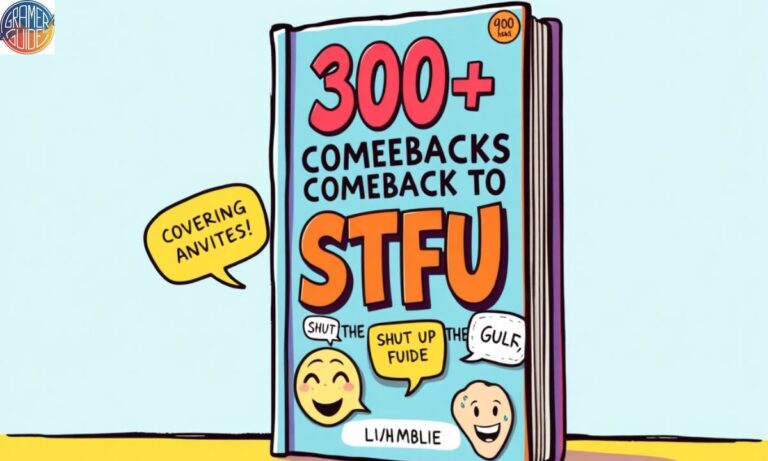Everyone has faced the frustrating moment when someone tells them to “shut the fuck up”. Instead of letting it ruin your mood, it’s best to respond with a quick comeback that keeps the situation under control. Whether you want to be witty, sarcastic, or polite, there’s a comeback for every situation. Here are 300+ clever responses to handle being told to shut up like a pro. Get ready to shut down anyone who tries to silence you!

Witty Comebacks
Witty comebacks are sharp, clever, and often funny. They catch the person off guard and make them think twice.
- “Oh, I didn’t realize I was speaking.”
- “Are you practicing for a mime competition?”
- “I’ll stop talking when you start listening.”
- “I’m sorry, did you say something?”
- “That’s a cute way of saying, ‘I’m out of arguments.'”
- “It’s cute how you think I care.”
- “I don’t need your approval, just your silence.”
- “Your opinion is as useful as a screen door on a submarine.”
- “Was that supposed to hurt my feelings?”
- “Did you practice that line or was it off the top of your head?”
- “I’ll take that as a compliment.”
- “Are you done, or should I grab some popcorn?”
Savage Replies
Savage replies are bold and direct. They make it clear that you won’t be disrespected.
- “I’m sorry, I don’t speak nonsense.”
- “If I wanted your opinion, I’d ask for it.”
- “Are you always this rude, or is today special?”
- “It’s funny how you’re upset over something that doesn’t involve you.”
- “You’re welcome to leave the conversation anytime.”
- “Let me know when you learn how to hold a conversation.”
- “Don’t worry, I’m sure your silence will be more interesting.”
- “Do I need to call a translator for that nonsense?”
- “Go ahead, try saying that again without sounding stupid.”
- “I’ll let you win this time, but don’t expect it again.”
- “Your mouth works overtime, but your brain is on vacation.”
- “You’re trying really hard to be rude, aren’t you?”
Sarcastic Zingers
Sarcasm is a great way to deflect insults and get the last word. These comebacks are playful and sting a little.
- “Oh, I’m sorry, I didn’t realize I was in the presence of greatness.”
- “Please, don’t stop now, I was just starting to enjoy the nonsense.”
- “Thanks for that brilliant insight; I’ll cherish it forever.”
- “I wish I could be as cool as you when I grow up.”
- “Wow, your words are like music… in a foreign language.”
- “I’ve never heard such a profound statement before. Truly life-changing.”
- “Oh, I love how you’re so creatively rude!”
- “Keep talking, I’m sure I’ll get something useful from it eventually.”
- “That’s such an interesting point. Said no one ever.”
- “You should write a book about your wisdom. People would love it.”
- “Let me guess, that’s your best comeback, right?”
- “Is this your idea of a joke? Because I’m not laughing.”
Confident Responses
Confidence is key when responding to insults. These comebacks showcase your self-assurance and set boundaries.
- “I don’t need your approval to feel good about myself.”
- “I don’t engage in childish arguments.”
- “I know my worth, and you don’t get to define it.”
- “Your opinion doesn’t affect my confidence.”
- “You don’t like my words? That’s not my problem.”
- “Confidence looks good on me, doesn’t it?”
- “I’m not worried about what you think, sorry.”
- “If you’re upset by my confidence, that’s your issue.”
- “I don’t need anyone’s permission to speak my mind.”
- “I’m not the problem, your attitude is.”
- “Feel free to talk, but know it won’t change anything.”
- “I’m good with who I am, thank you.”
Playful Retorts
Sometimes, the best way to respond is with humor and playfulness. These responses keep things lighthearted.
- “You’re cute when you’re mad.”
- “Oh, you want me to shut up? I thought we were having fun.”
- “I could be quiet, but where’s the fun in that?”
- “You know, silence is overrated.”
- “Are you sure you want to end this conversation? I was just getting started.”
- “Don’t worry, I’ll stop talking once you come up with something better to say.”
- “I’m not shutting up, I’m just warming up.”
- “You know, you’re very persistent for someone who doesn’t have a point.”
- “Do you need a break, or can you handle my brilliance?”
- “Maybe you should take a nap; I’m only getting started.”
- “Well, if you insist, I’ll just take a short break from being awesome.”
- “I’ll keep talking if you promise to keep listening.”
Intellectual Replies
For those who prefer to take a more thoughtful approach, intellectual replies can shut down a conversation in the best way possible.
- “I’ll stop when you start making valid points.”
- “Your silence might be more beneficial than your words.”
- “Have you considered that maybe the problem isn’t me, but your perspective?”
- “Sometimes silence is the most intelligent response.”
- “Not everything I say needs to be accepted by everyone.”
- “You may disagree, but that doesn’t mean I’m wrong.”
- “Silence is not an admission of guilt, but an invitation for reflection.”
- “Perhaps you should reflect on your thoughts before sharing them.”
- “You can be quiet, or I can make you think.”
- “Engage in dialogue when you’re ready to have a real conversation.”
- “An opinion is only valid when it’s supported by facts.”
- “Instead of shutting me up, maybe you should broaden your horizons.”
Self-Deprecating Humor
Sometimes, making fun of yourself is the best way to deflect hostility and put the focus back on the other person.
- “Sure, I’ll shut up, but only after I’ve made your day a little better.”
- “You’re right, I’m probably saying too much for someone as awesome as you.”
- “I can’t help it; I’m just so good at talking.”
- “Oops, I did it again. I’m so chatty!”
- “It’s like I have a condition that makes me talk too much.”
- “Yeah, I talk a lot—kind of a problem I have.”
- “I’d love to be quiet, but it’s not in my nature.”
- “I’m like a broken record, but at least I’m entertaining.”
- “My friends love to tell me to shut up, but I just can’t help myself.”
- “I know, I’m a chatterbox, but you’re just too fun to ignore.”
- “I talk too much? It’s just my charming personality at work.”
- “I’ll try to shut up, but I’m really bad at it.”
Rhetorical Questions
Rhetorical questions are a great way to make someone think before they continue their disrespectful behavior.
- “Why do you feel the need to tell me what to do?”
- “Does it really bother you that much when I speak?”
- “Are you asking me to be quiet because you have no answer?”
- “If you don’t like my words, why are you still listening?”
- “Do you often tell people to shut up, or am I just special?”
- “Is your silence supposed to make me feel bad?”
- “Why do you think your opinion matters so much to me?”
- “What exactly did I say that’s bothering you?”
- “Isn’t freedom of speech a thing here?”
- “Why does my voice disturb your peace so much?”
- “Should I be quiet just because it’s inconvenient for you?”
- “What are you afraid of, my words or my silence?”
Deflective Humor
Deflecting humor is a great way to redirect a conversation away from negativity and keep things light.
- “I’m sorry, I didn’t realize you were a professional critic.”
- “Is this a roast session, or should I take my talent elsewhere?”
- “You’re going to need a lot more than that to shut me up.”
- “You can’t shut me up—I’m like a broken record.”
- “You know, silence doesn’t look good on me.”
- “Oh, is this the part where you get all quiet and awkward?”
- “Don’t worry, I’m sure you’ll have something to say after I’m done.”
- “Isn’t it cute when people think their words matter?”
- “Can you teach me how to shut up? I’m clearly not doing it right.”
- “Are you the word police? Because I don’t think I’m breaking any laws.”
- “It’s okay, I’ll be quiet when pigs fly.”
- “You should really stop trying to control the conversation.”
Emotional Appeals
Appealing to emotions can disarm someone who is being rude and open up a different kind of conversation.
- “I’m not here to fight, but to share thoughts.”
- “We don’t need to be harsh to make our points.”
- “It’s okay to disagree, but let’s do it respectfully.”
- “We all have feelings; let’s not hurt each other.”
- “Sometimes silence speaks louder than words.”
- “I’m here for a meaningful conversation, not a battle.”
- “Why resort to anger when we can communicate calmly?”
- “I’d rather we discuss this thoughtfully instead of just shutting down.”
- “I didn’t come here to hurt anyone’s feelings.”
- “We can have a good conversation without the hostility.”
- “Don’t let words come between us when we both want to be heard.”
- “Let’s respect each other and keep things civil.”
Philosophical Insights
Philosophical comebacks focus on the bigger picture and aim to bring a deeper sense of reflection to the conversation. These responses make others think, rather than just reacting in the moment.
- “Silence is often a sign of wisdom, don’t you think?”
- “In the grand scheme of things, words are fleeting.”
- “You cannot silence the truth, no matter how loud you get.”
- “What is silence if not a form of expression in itself?”
- “Sometimes, saying nothing speaks more than a thousand words.”
- “The loudest voices are often the least insightful.”
- “Maybe the quietest person has the most valuable things to say.”
- “Isn’t it the silence that helps us hear the truth?”
- “Sometimes, it’s better to listen than to speak.”
- “Words can be weapons; silence can be peace.”
- “True wisdom often speaks through silence.”
- “Maybe the quiet person is thinking deeper thoughts than the loud one.”
Polite Yet Firm
Sometimes, a polite yet firm response is the best way to stand your ground without escalating the situation. These comebacks help you maintain your composure while asserting yourself.
- “I would appreciate a little more respect in this conversation.”
- “I hear you, but I have a different perspective.”
- “Let’s keep this respectful, shall we?”
- “I understand you’re upset, but that’s not the way to express it.”
- “I’d prefer if you didn’t interrupt me while I’m speaking.”
- “I’m not trying to argue; I just have a different opinion.”
- “We can have a discussion without using harsh words.”
- “I respect your point of view, but I disagree.”
- “I’m not interested in engaging in that kind of conversation.”
- “Let’s keep this conversation civil, please.”
- “I’m happy to listen, but let’s be respectful of each other.”
- “That’s not the type of energy I’m willing to engage with.”
Feigned Shock
Feigned shock responses are an excellent way to call out the absurdity of someone’s comment. These responses mock the person’s attempt to shut you down while keeping things lighthearted.
- “I can’t believe you just said that!”
- “Did you really just ask me to shut up?”
- “Oh, wow! That’s the best comeback you’ve got?”
- “I’m shocked at how rude you’re being right now.”
- “Did I hear that right? You want me to be quiet?”
- “Wow, that was unexpected. I didn’t think you’d go there.”
- “You must be joking if you think that will work.”
- “I’m sorry, I didn’t realize we were done talking.”
- “Did you actually think that would hurt my feelings?”
- “That’s a new low for comebacks, even for you.”
- “Oh, I’m sorry! I didn’t know you had the power to silence me.”
- “I didn’t know we were in the ‘shut up’ contest. Did I win?”
Nonchalant Responses
Nonchalant responses allow you to brush off someone’s rude remark with minimal effort. These comebacks don’t make a big deal out of the situation, which leaves the other person feeling ignored.
- “Okay, cool, whatever.”
- “That’s cute.”
- “Alright, if that’s what you want.”
- “I’m not bothered, but thanks for sharing.”
- “Sure, I’ll be quiet when I feel like it.”
- “Meh, I’m not bothered by that.”
- “Not my problem, but thanks for your input.”
- “I’m fine with talking, you do you.”
- “Sure, I’ll shut up when pigs fly.”
- “Well, that’s one way to get my attention.”
- “Thanks for the suggestion, I’ll take it under consideration.”
- “If you say so, but it’s not changing my mind.”
Meme-Inspired Comebacks
Meme-inspired comebacks use humor and internet culture to create responses that are both funny and clever. These work especially well for younger audiences and those who appreciate a good meme reference.
- “Shut up? Sorry, I’m too busy living my best life.”
- “I’m not here to shut up, I’m here to vibe.”
- “That’s a ‘nope’ from me, dog.”
- “Is this a challenge? Because I don’t think you can win.”
- “Who even says that anymore?”
- “Shut up? More like ‘Shut up and take my energy!’”
- “Did you just ‘shut up’ me? Big mistake.”
- “It’s not me, it’s the vibe that’s off here.”
- “You want me to shut up? Sorry, I can’t hear you over the WiFi.”
- “Did I ask for your opinion? Didn’t think so.”
- “That’s what she said.”
- “Oh, are we still doing that? I thought we were past it.”
Text-Friendly Replies
Text-friendly comebacks are short, sweet, and easy to use in a quick text conversation. These one-liners keep things simple while still delivering an effective response.
- “K.”
- “Cool story, bro.”
- “LOL. Try again.”
- “Nah, I’m good.”
- “I’m fine, thanks.”
- “Good one.”
- “Can’t hear you over the WiFi.”
- “Okay, but no one asked.”
- “Sure, whatever you say.”
- “I’m good, thanks for the input.”
- “Don’t need your approval.”
- “Interesting choice of words.”
Sarcastic Compliments
Sarcastic compliments are a great way to flip the situation and respond with humor. They work by giving back an exaggerated or backhanded compliment.
- “Wow, you should teach a masterclass on how to be rude.”
- “You’re so good at this, you should write a book about it.”
- “I’ve never met someone with such bold opinions. How do you do it?”
- “You should be on TV. You’d be perfect for reality shows.”
- “You’re such a communicator. Maybe you should run a podcast.”
- “You have such a talent for interruption. Truly impressive.”
- “That was so thoughtful. I’m genuinely moved.”
- “You have a real gift for making people uncomfortable.”
- “You should start a club for people who love saying shut up.”
- “It’s amazing how you manage to make such a simple request sound so aggressive.”
- “I’m genuinely impressed by your ability to stay rude.”
- “You should wear a cape. You’re a real superhero of negativity.”
Unexpected Responses
Unexpected responses catch the person off guard. These comebacks break the usual pattern and surprise the person who tried to shut you down.
- “You’re right, I should just take a nap instead.”
- “Let’s take a moment of silence for your intelligence.”
- “I think you meant to say something else, didn’t you?”
- “Oh, you want me to be quiet? How unusual.”
- “Okay, but I don’t really take orders from people.”
- “I’m sure that works with others, but not with me.”
- “I didn’t see that one coming, nice try though.”
- “Wait, were you trying to say something just now?”
- “Are you giving up on this conversation so soon?”
- “Maybe you just need a hug instead of an argument.”
- “Did I just get told off? That’s a first.”
- “Interesting, usually I’m the one telling people to shut up.”
Quick One-Liners
Sometimes a quick one-liner is the best way to shut someone down. These comebacks are short, sweet, and to the point.
- “Keep dreaming.”
- “Not today.”
- “I’ll pass.”
- “You’re hilarious.”
- “Do better.”
- “Cool story.”
- “Okay, I’m done.”
- “Just stop.”
- “That’s it?”
- “Try harder.”
- “No thanks.”
- “Not interested.”
Situational Retorts
Situational retorts are tailored to the specific context or environment. They show you’re paying attention and able to think on your feet.
- “Well, if we’re done, I’ll just leave.”
- “It seems like you’re having a rough day; let’s talk later.”
- “Not the best place for this, don’t you think?”
- “If we’re not going to have a constructive conversation, I’m out.”
- “I don’t think this is the time or place for that.”
- “We can argue later when we’re not in public.”
- “You want me to be quiet? Maybe you should try that too.”
- “If that’s all you’ve got, I’m not interested in continuing.”
- “Are we really doing this right now? Seems unnecessary.”
- “I don’t think this is how we solve problems, do you?”
- “Let’s keep it civil, we’re in the middle of something.”
- “If you need space to think, I’m happy to give it to you.”
FAQ’s
What should I do if someone tells me to shut up?
If someone tells you to shut up, stay calm and respond confidently. You can use a sarcastic or witty comeback to take control of the situation.
Are these comebacks meant to escalate the situation?
No, the comebacks in this guide are designed to defuse tension and respond with confidence without escalating the conflict.
How can I use these comebacks in real life?
You can use these comebacks during conversations or online chats when someone tries to silence you. Just make sure to choose the right one based on the situation.
Are these comebacks suitable for all ages?
Yes, most comebacks in this guide are lighthearted and can be used in casual settings. However, some are more sarcastic, so use discretion when necessary.
How do I know which comeback to use?
It depends on the situation. If the person is being rude, go for a savage reply. For a more casual setting, a witty comeback might be more fitting.
Conclusion
Handling a “shut the fuck up” moment doesn’t have to be awkward or uncomfortable. With the right comeback, you can turn the situation around, keeping things cool and confident.
Whether you prefer being sarcastic, intellectual, or humorous, these 300+ comebacks have you covered. Keep your responses sharp, and don’t let anyone silence you!

I’m Hayyat, a passionate content writer and SEO expert with 5 years of experience. I specialize in creating engaging content and optimizing it for search engines.





